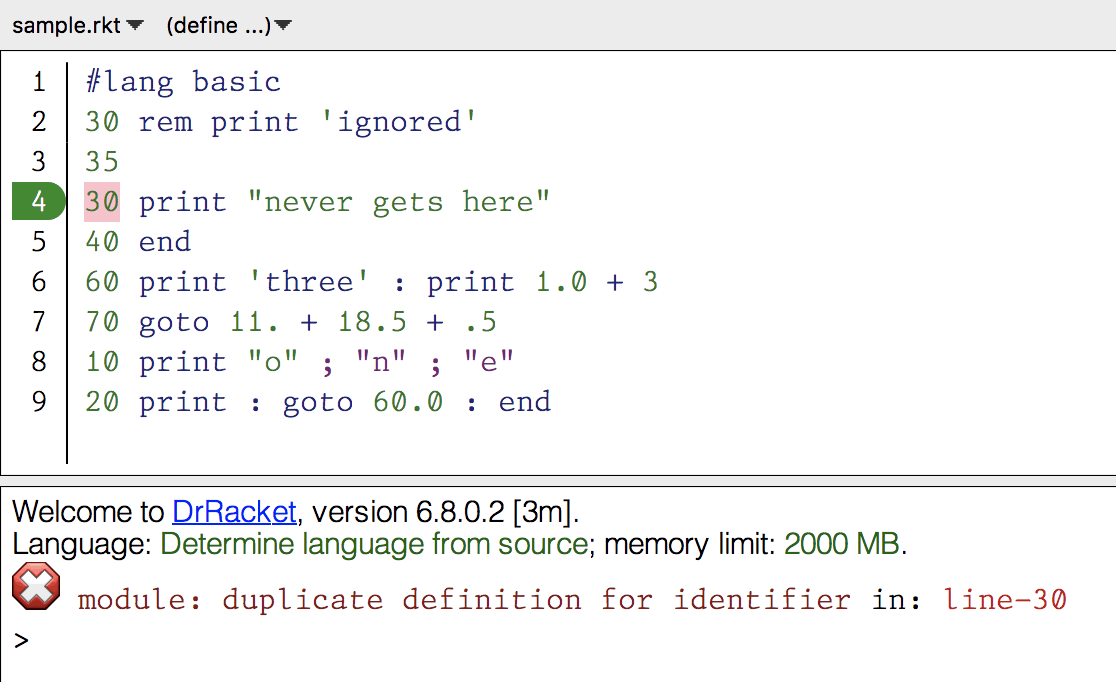Beautiful Racket / tutorials
Go with the flow: basic
- 1 intro
- 2 specification and setup
- 3 the lexer
- 4 the tokenizer
- 5 the parser
- 6 the reader
- 7 the expander
- 8 testing the language
- 9 recap
- 10 source listing
But does it work? Let’s start with the all-time BASIC favorite:
10 print "HELLO WORLD!"
20 goto 10
1 2 3 | #lang basic 10 print "HELLO WORLD!" 20 goto 10 |
HELLO WORLD!
HELLO WORLD!
HELLO WORLD!
HELLO WORLD!
HELLO WORLD!
···
1 2 3 4 5 6 7 | HELLO WORLD! HELLO WORLD! HELLO WORLD! HELLO WORLD! HELLO WORLD! HELLO WORLD! ··· |
Let’s also try our original sample program, which was designed to cause extra grief for the tokenizer and the parser:
30 rem print 'ignored'
35
50 print "never gets here"
40 end
60 print 'three' : print 1.0 + 3
70 goto 11. + 18.5 + .5 rem ignored
10 print "o" ; "n" ; "e"
20 print : goto 60.0 : end
1 2 3 4 5 6 7 8 9 | #lang basic 30 rem print 'ignored' 35 50 print "never gets here" 40 end 60 print 'three' : print 1.0 + 3 70 goto 11. + 18.5 + .5 rem ignored 10 print "o" ; "n" ; "e" 20 print : goto 60.0 : end |
three
4
1 2 3 4 | one three 4 |
Let’s also see how our source locations worked out. Suppose we change line number 50 to be 30:
30 rem print 'ignored'
35
30 print "never gets here"
40 end
60 print 'three' : print 1.0 + 3
70 goto 11. + 18.5 + .5
10 print "o" ; "n" ; "e"
20 print : goto 60.0 : end
1 2 3 4 5 6 7 8 9 | #lang basic
30 rem print 'ignored'
35
30 print "never gets here"
40 end
60 print 'three' : print 1.0 + 3
70 goto 11. + 18.5 + .5
10 print "o" ; "n" ; "e"
20 print : goto 60.0 : end
|
DrRacket will raise the error we’d expect it to when it finds conflicting definitions, and the offending line is highlighted correctly:

Let’s switch it back, and see what happens if we introduce a bogus line number in the last goto:
30 rem print 'ignored'
35
50 print "never gets here"
40 end
60 print 'three' : print 1.0 + 3
70 goto 11. + 18.5 + .5
10 print "o" ; "n" ; "e"
20 print : goto 6000.0 : end
1 2 3 4 5 6 7 8 9 | #lang basic 30 rem print 'ignored' 35 50 print "never gets here" 40 end 60 print 'three' : print 1.0 + 3 70 goto 11. + 18.5 + .5 10 print "o" ; "n" ; "e" 20 print : goto 6000.0 : end |
1 | error in line 20: line 6000 not found |
A side effect of making our lines into functions is that they’re available in the DrRacket REPL like any other function. For instance:
one
(line-60)
three
4
(line-70)
uncaught exception: #<change-line-signal>
1 2 3 4 5 6 7 | > (line-10) one > (line-60) three 4 > (line-70) uncaught exception: #<change-line-signal> |
This last result makes sense: we’re trying to execute a goto outside the context of the program loop.